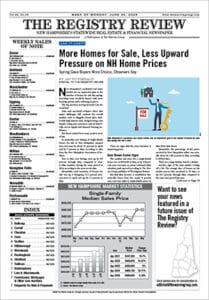
With biotech booming in Boston and life science firms looking for nearby locations to set up factories, the team behind Salem’s biggest real estate play in a generation is looking to reorient what was once an office-retail project in a new direction.
Noted food entrepreneur Joe Faro, founder of Tuscan Brands, has spent the past five years working to bring Tuscan Village, an ambitious 2.8 million-square-foot mixed-use urban development on the site of the former Rockingham Park horse track in Salem to fruition.
As of January, about half of the site was under construction, with the multi-phased project expected to take another five years to complete.
But Faro’s development team pivoted its original plans over the fall, swapping out a majority of the proposed office space for R&D and biomanufacturing space, hoping to take advantage of the rising interest from the previously niche life sciences industry.
The Tuscan Village Master Plan Update, which was presented to the town of Salem in November, now includes approximately 155,000 square feet for limited office use and labs for research and development, as well as 672,000 square feet of space for drug manufacturing. Medical office space in the project is also being reduced to 162,250 square feet and a 40,000-square-foot warehouse space is also being proposed.
The changes replace a 575,000-square-foot office park and 200,000 square feet of medical office space planned for the area just north of the development’s main, pedestrian-focused, entertainment and retail area. The size of the project’s hotel remains unchanged but 119,000 square feet of retail is being eliminated.
Office Slump Prompts Change
Michael Powers, Tuscan Brands’ senior vice president of retail leasing, said what made sense 18 months ago, didn’t make sense for today.
“Residential has been hot but there’s been a shift from the centralized office market to a more diversified office market, with people getting comfortable working from wherever,” he said. “We’re just reacting to that and the demand drivers as we try to find the best uses for the project, and it changes.”
While office rents in southeastern New Hampshire were up 3 percent and occupancy held steady at 91.15 percent year-over-year in 2020, the 23 million-square-foot market saw 314,500 square feet of negative net absorption in the third quarter, according to Colliers International research. And questions linger about the demand for office space post-pandemic.
With pharmaceutical companies looking for real estate strategies that will allow them to be proximate to research labs while still having access to a strong talent pipeline, the transition made sense.
“The whole biotech community in the Greater Boston market is strong,” Powers said. “From our perspective, we have this great New Hampshire advantage based on the lack of tax hurdles that corporations and individuals are subject to and it makes sense that these companies will want to come into our community.”
Salem Planning Director Ross Moldoff said the town’s Planning Board is very excited about the project and that it will be a transformational one for the town. He sees the move towards the life sciences sector as a savvy decision and plays into the new realities of commercial real estate development in the COVID era.
He added that the boards and committees involved in planning are doing what they can to help move the project along and don’t foresee any issues with the updated master plan.
Drugmaking Boom
Tuscan Village is looking to get a slice of the biotech boom that’s transforming exurban real estate outside of Boston in neighboring Massachusetts. With vacancy rates in the industry’s heart in Cambridge, Massachusetts hovering well below 1 percent and asking rents over $80 per square foot, triple-net, according to Newmark research, drug companies looking to manufacture their products nearby have to look to further afield.
“Many major life science companies are rethinking their global supply chain that has been dominated by China and India. This reliance has spurred many companies to seek a redundant supply chain with a local focus on drug manufacturing,” Tuscan Village Salem Senior Managing Director Glenn P. Verrette said, predicting “explosive” growth in the region as a result.”
According to a recent report by CBRE, the life science sector has reached historic new highs in 2020 thanks to an increase in R&D employment and the growing availability of venture-capital funding, with the Boston-Cambridge area the most active cluster in the U.S., nearly doubling the space (approximately 49 million square feet) of the next largest cluster in the San Francisco Bay Area.
Already, developers are working on projects that could hold up to 700,000 square feet of new manufacturing space at the former Fort Devens in Massachusetts and 530,000 square feet at a dedicated industrial park in Worcester, Massachusetts. Tuscan Village’s contribution would add a third major cluster of uncommitted manufacturing space close enough to researchers in and around Boston to enable close communication as drugs are developed, tested and tweaked in an industry where speed to market is critical. Tuscan Village will join major facilities nearby in Andover, Massachusetts, occupied by life science companies like Pfizer and Sarepta Therapeutics.
“Nine out of 10 life science companies are experiencing real growth, compared to one in 50 office users,” Verrette said. “Tuscan Village is simply adapting to the marketplace. Office users are currently moving cautiously as they determine where they need to be located in a post-pandemic world. We believe Tuscan Village provides a shovel-ready site that can meet a variety of uses from office and medical to lab R&D and biomanufacturing companies that are seeking customized space in a highly amenitized environment, while leveraging the New Hampshire [tax] advantage.”

